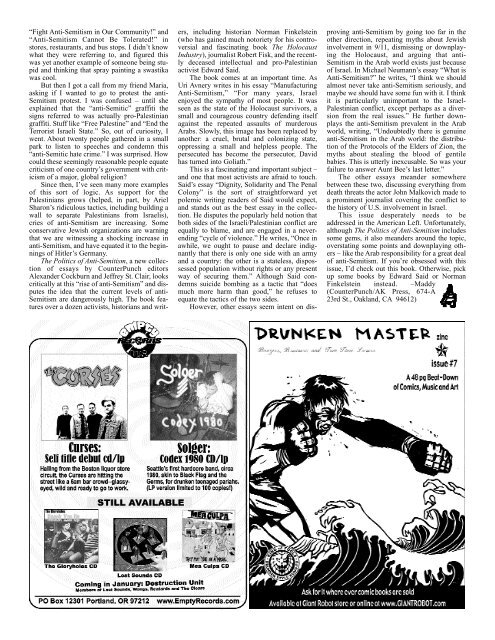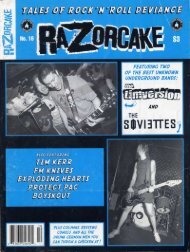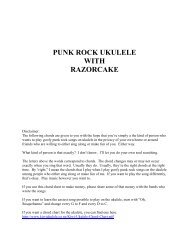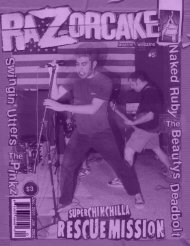You also want an ePaper? Increase the reach of your titles
YUMPU automatically turns print PDFs into web optimized ePapers that Google loves.
“Fight Anti-Semitism in Our Community!” and“Anti-Semitism Cannot Be Tolerated!” instores, restaurants, and bus stops. I didn’t knowwhat they were referring to, and figured thiswas yet another example of someone being stupidand thinking that spray painting a swastikawas cool.But then I got a call from my friend Maria,asking if I wanted to go to protest the anti-Semitism protest. I was confused – until sheexplained that the “anti-Semitic” graffiti thesigns referred to was actually pro-Palestiniangraffiti. Stuff like “Free Palestine” and “End theTerrorist Israeli State.” So, out of curiosity, Iwent. About twenty people gathered in a smallpark to listen to speeches and condemn this“anti-Semitic hate crime.” I was surprised. Howcould these seemingly reasonable people equatecriticism of one country’s government with criticismof a major, global religion?Since then, I’ve seen many more examplesof this sort of logic. As support for thePalestinians grows (helped, in part, by ArielSharon’s ridiculous tactics, including building awall to separate Palestinians from Israelis),cries of anti-Semitism are increasing. Someconservative Jewish organizations are warningthat we are witnessing a shocking increase inanti-Semitism, and have equated it to the beginningsof Hitler’s Germany.The Politics of Anti-Semitism, a new collectionof essays by CounterPunch editorsAlexander Cockburn and Jeffrey St. Clair, lookscritically at this “rise of anti-Semitism” and disputesthe idea that the current levels of anti-Semitism are dangerously high. The book featuresover a dozen activists, historians and writers,including historian Norman Finkelstein(who has gained much notoriety for his controversialand fascinating book The HolocaustIndustry), journalist Robert Fisk, and the recentlydeceased intellectual and pro-Palestinianactivist Edward Said.The book comes at an important time. AsUri Avnery writes in his essay “ManufacturingAnti-Semitism,” “For many years, Israelenjoyed the sympathy of most people. It wasseen as the state of the Holocaust survivors, asmall and courageous country defending itselfagainst the repeated assaults of murderousArabs. Slowly, this image has been replaced byanother: a cruel, brutal and colonizing state,oppressing a small and helpless people. Thepersecuted has become the persecutor, Davidhas turned into Goliath.”This is a fascinating and important subject –and one that most activists are afraid to touch.Said’s essay “Dignity, Solidarity and The PenalColony” is the sort of straightforward yetpolemic writing readers of Said would expect,and stands out as the best essay in the collection.He disputes the popularly held notion thatboth sides of the Israeli/Palestinian conflict areequally to blame, and are engaged in a neverending“cycle of violence.” He writes, “Once inawhile, we ought to pause and declare indignantlythat there is only one side with an armyand a country: the other is a stateless, dispossessedpopulation without rights or any presentway of securing them.” Although Said condemnssuicide bombing as a tactic that “doesmuch more harm than good,” he refuses toequate the tactics of the two sides.However, other essays seem intent on disprovinganti-Semitism by going too far in theother direction, repeating myths about Jewishinvolvement in 9/11, dismissing or downplayingthe Holocaust, and arguing that anti-Semitism in the Arab world exists just becauseof Israel. In Michael Neumann’s essay “What isAnti-Semitism?” he writes, “I think we shouldalmost never take anti-Semitism seriously, andmaybe we should have some fun with it. I thinkit is particularly unimportant to the Israel-Palestinian conflict, except perhaps as a diversionfrom the real issues.” He further downplaysthe anti-Semitism prevalent in the Arabworld, writing, “Undoubtedly there is genuineanti-Semitism in the Arab world: the distributionof the Protocols of the Elders of Zion, themyths about stealing the blood of gentilebabies. This is utterly inexcusable. So was yourfailure to answer Aunt Bee’s last letter.”The other essays meander somewherebetween these two, discussing everything fromdeath threats the actor John Malkovich made toa prominent journalist covering the conflict tothe history of U.S. involvement in Israel.This issue desperately needs to beaddressed in the American Left. Unfortunately,although The Politics of Anti-Semitism includessome gems, it also meanders around the topic,overstating some points and downplaying others– like the Arab responsibility for a great dealof anti-Semitism. If you’re obsessed with thisissue, I’d check out this book. Otherwise, pickup some books by Edward Said or NormanFinkelstein instead. –Maddy(CounterPunch/AK Press, 674-A23rd St., Oakland, CA 94612)
















